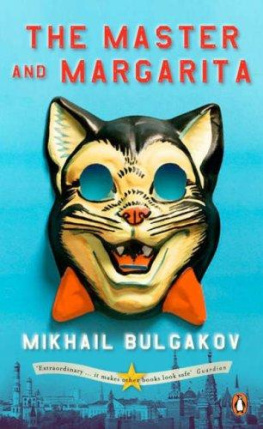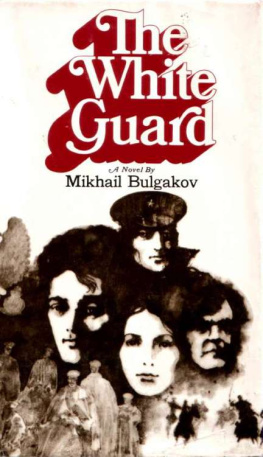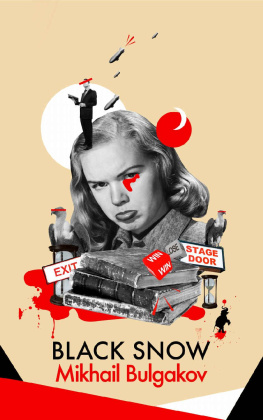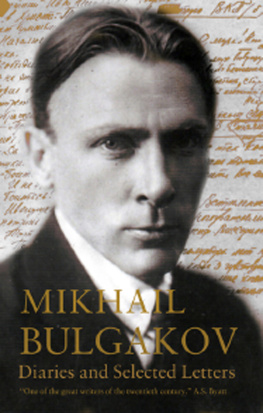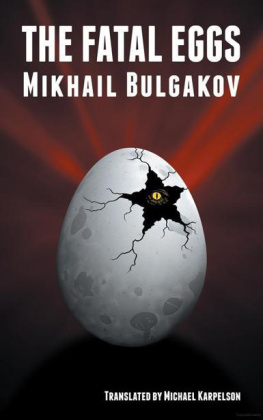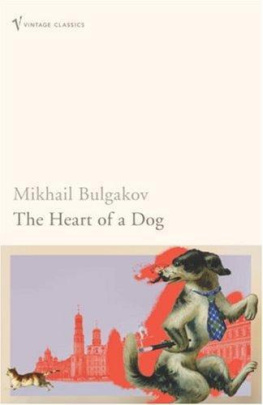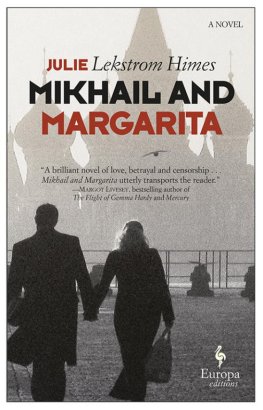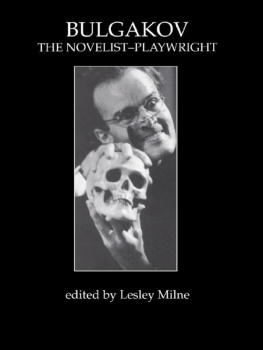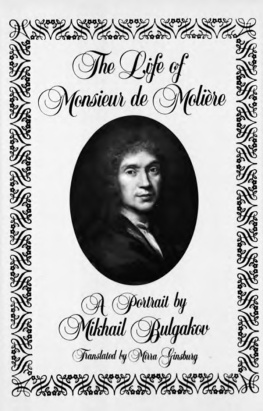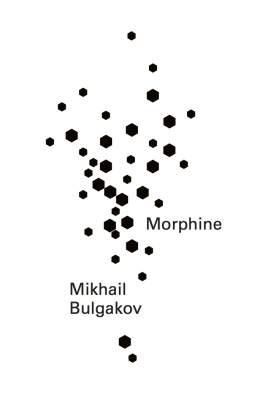Mikhail Bulgakov - The Master and Margarita
Here you can read online Mikhail Bulgakov - The Master and Margarita full text of the book (entire story) in english for free. Download pdf and epub, get meaning, cover and reviews about this ebook. year: 2006, publisher: Penguin Classics, genre: Detective and thriller. Description of the work, (preface) as well as reviews are available. Best literature library LitArk.com created for fans of good reading and offers a wide selection of genres:
Romance novel
Science fiction
Adventure
Detective
Science
History
Home and family
Prose
Art
Politics
Computer
Non-fiction
Religion
Business
Children
Humor
Choose a favorite category and find really read worthwhile books. Enjoy immersion in the world of imagination, feel the emotions of the characters or learn something new for yourself, make an fascinating discovery.
- Book:The Master and Margarita
- Author:
- Publisher:Penguin Classics
- Genre:
- Year:2006
- Rating:3 / 5
- Favourites:Add to favourites
- Your mark:
- 60
- 1
- 2
- 3
- 4
- 5
The Master and Margarita: summary, description and annotation
We offer to read an annotation, description, summary or preface (depends on what the author of the book "The Master and Margarita" wrote himself). If you haven't found the necessary information about the book — write in the comments, we will try to find it.
The Master and Margarita — read online for free the complete book (whole text) full work
Below is the text of the book, divided by pages. System saving the place of the last page read, allows you to conveniently read the book "The Master and Margarita" online for free, without having to search again every time where you left off. Put a bookmark, and you can go to the page where you finished reading at any time.
Font size:
Interval:
Bookmark:

Table of Contents

THE MASTER AND MARGARITA
MIKHAIL BULGAKOV was born in Kiev in May 1891. He studied and briefly practised medicine and, after indigent wanderings through revolutionary Russia and the Caucasus, he settled in Moscow in 1921. His sympathetic portrayal of White characters in his stories, in the plays The Days of the Turbins (The White Guard), which enjoyed great success at the Moscow Art Theatre in 1926, and Flight (1927), and his satirical treatment of the officials of the New Economic Plan, led to growing criticism, which became violent after the play The Purple Island. His later works treat the subject of the artist and the tyrant under the guise of historical characters, with plays such as Molire, staged in 1936, Don Quixote, staged in 1940, and Pushkin, staged in 1943. He also wrote a brilliant biography, highly original in form, of his literary hero, Molire, but The Master and Margarita, a fantasy novel about the devil and his henchmen set in modern Moscow, is generally considered his masterpiece. Fame, at home and abroad, was not to come until a quarter of a century after his death at Moscow in 1940.
RICHARD PEVEAR and LARISSA VOLOKHONSKY have produced acclaimed translations of works by Mikhail Bulgakov, Fyodor Dostoyevsky, Nikolai Gogol, Anton Chekhov, and Leo Tolstoy. They have twice won the PEN/Book-of-the-Month Club Translation Prize for Dostoevskys The Brothers Karamazov and for Tolstoys Anna Karenina. Their translations of Tolstoys What Is Art? and Anna Karenina are published in Penguin Classics. Pevear, a native of Boston, and Volokhonsky, of St. Petersburg, and married to each other and live in Paris.

PENGUIN BOOKS
Published by the Penguin Group
Penguin Group (USA) Inc., 375 Hudson Street, New York, New York 10014, U.S.A.
Penguin Group (Canada), 90 Eglinton Avenue East, Suite 700, Toronto, Ontario,
Canada M4P 2Y3 (a division of Pearson Penguin Canada Inc.)
Penguin Books Ltd, 80 Strand, London WC2R oRL, England
Penguin Ireland, 25 St Stephens Green, Dublin 2, Ireland (a division of Penguin Books Ltd)
Penguin Group (Australia), 250 Camberwell Road, Camberwell, Victoria 3124,
Australia (a division of Pearson Australia Group Pry Ltd)
Penguin Books India Pvt Ltd, 11 Community Centre, Panchsheel Park,
New Delhi 110 017, India
Penguin Group (NZ), 67 Apollo Drive, Rosedale, North Shore 0632, New Zealand
(a division of Pearson New Zealand Ltd)
Penguin Books (South Africa) (Pty) Ltd, 24 Sturdee Avenue, Rosebank,
Johannesburg 2196, South Africa
Penguin Books Ltd, Registered Offices: 80 Strand, London WC2R oRL, England
First published as Master i Margarita in serial form in Moskva, 1966-7
This translation published in Penguin Books 1997
Text copyright Mikhail Bulgakov, 1966, 1967
Translation, Further Reading and Notes copyright Richard Pevear and
Larissa Volokhonsky, 1997
Introduction copyright Richard Pevear, 1997
All rights reserved
eISBN : 978-1-440-67408-2
Set in 10/12pt Monotype Garamond
The scanning, uploading and distribution of this book via the Internet or via any
other means without the permission of the publisher is illegal and punishable by law.
Please purchase only authorized electronic editions, and do not participate in or encourage
electronic piracy of copyrighted materials. Your support of the authors rights is appreciated.
http://us.penguingroup.com
Introduction
Mikhail Bulgakov worked on this luminous book throughout one of the darkest decades of the century. His last revisions were dictated to his wife a few weeks before his death in 1940 at the age of forty-nine. For him, there was never any question of publishing the novel. The mere existence of the manuscript, had it come to the knowledge of Stalins police, would almost certainly have led to the permanent disappearance of its author. Yet the book was of great importance to him, and he clearly believed that a time would come when it could be published. Another twenty-six years had to pass before events bore out that belief and The Master and Margarita, by what seems a surprising oversight in Soviet literary politics, finally appeared in print. The effect was electrifying.
The monthly magazine Moskva, otherwise a rather cautious and quiet publication, carried the first part of The Master and Margarita in its November 1966 issue. The 150,000 copies sold out within hours. In the weeks that followed, group readings were held, people meeting each other would quote and compare favourite passages, there was talk of little else. Certain sentences from the novel immediately became proverbial. The very language of the novel was a contradiction of everything wooden, official, imposed. It was a joy to speak.
When the second part appeared in the January 1967 issue of Moskva, it was greeted with the same enthusiasm. Yet this was not the excitement caused by the emergence of a new writer, as when Aleksandr Solzhenitsyns One Day in the Life of Ivan Denisovich appeared in the magazine Novy Mir in 1962. Bulgakov was neither unknown nor forgotten. His plays had begun to be revived in theatres during the late fifties and were published in 1962. His superb Life of Monsieur de Molire came out in that same year. His early stories were reprinted. Then, in 1965, came the Theatrical Novel, based on his years of experience with Stanislavskys renowned Moscow Art Theatre. And finally in 1966 a volume of Selected Prose was published, containing the complete text of Bulgakovs first novel, The White Guard, written in the twenties and dealing with the nearly contemporary events of the Russian civil war in his native Kiev and the Ukraine, a book which in its clear-sighted portrayal of human courage and weakness ranks among the truest depictions of war in all of literature.
Bulgakov was known well enough, then. But, outside a very small group, the existence of The Master and Margarita was completely unsuspected. That certainly accounts for some of the amazement caused by its publication. It was thought that virtually all of Bulgakov had found its way into print. And here was not some minor literary remains but a major novel, the authors crowning work. Then there were the qualities of the novel itself its formal originality, its devastating satire of Soviet life, and of Soviet literary life in particular, its theatrical rendering of the Great Terror of the thirties, the audacity of its portrayal of Jesus Christ and Pontius Pilate, not to mention Satan. But, above all, the novel breathed an air of freedom, artistic and spiritual, which had become rare indeed, not only in Soviet Russia. We sense it in the special tone of Bulgakovs writing, a combination of laughter (satire, caricature, buffoonery) and the most unguarded vulnerability. Two aphorisms detachable from the novel may suggest something of the complex nature of this freedom and how it may have struck the novels first readers. One is the much-quoted Manuscripts dont burn, which seems to express an absolute trust in the triumph of poetry, imagination, the free word, over terror and oppression, and could thus become a watchword of the intelligentsia. The publication of The Master and Margarita was taken as a proof of the assertion. In fact, during a moment of fear early in his work on the novel, Bulgakov did burn what he had written. And yet, as we see, it refused to stay burned. This moment of fear, however, brings me to the second aphorism Cowardice is the most terrible of vices which is repeated with slight variations several times in the novel. More penetrating than the defiant Manuscripts dont burn, this word touched the inner experience of generations of Russians. To portray that experience with such candour required another sort of freedom and a love for something more than culture. Gratitude for such perfect expression of this other, deeper freedom must surely have been part of the enthusiastic response of readers to the novels first appearance.
Next pageFont size:
Interval:
Bookmark:
Similar books «The Master and Margarita»
Look at similar books to The Master and Margarita. We have selected literature similar in name and meaning in the hope of providing readers with more options to find new, interesting, not yet read works.
Discussion, reviews of the book The Master and Margarita and just readers' own opinions. Leave your comments, write what you think about the work, its meaning or the main characters. Specify what exactly you liked and what you didn't like, and why you think so.

